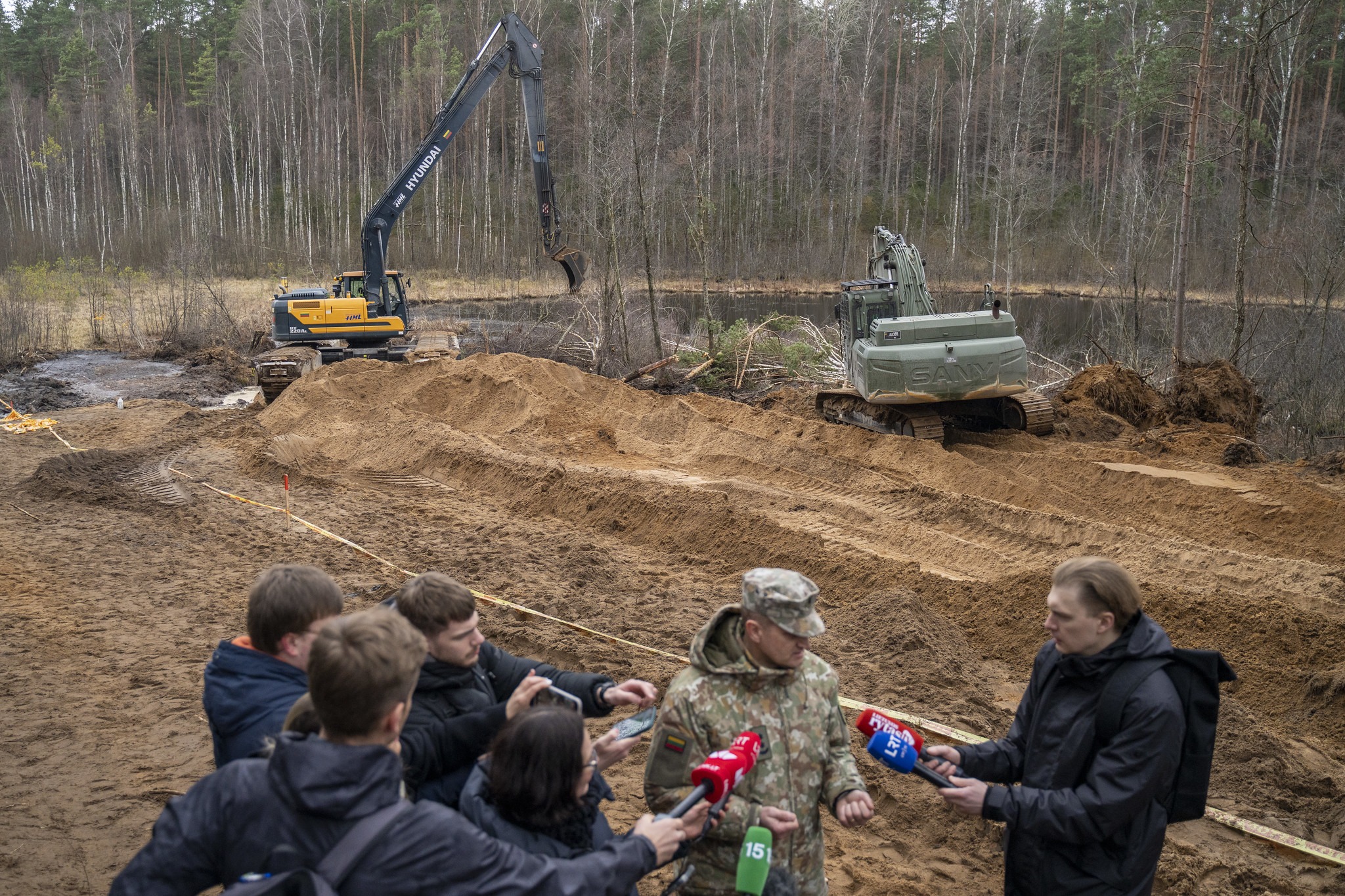
Key Insights:
- In March 2025, Lithuania faced several significant challenges that drew national and international attention while also being widely covered in local Kremlin-aligned media. These included the tragic incident involving four U.S. soldiers during a NATO training exercise near Pabradė, the growing concerns about the rise of the “5th column” in Lithuania, and a scandal involving a young Lithuanian singer who criticised the idea of “the art of killing.” These events stirred intense public debate and amplified tensions within the country. Meanwhile, the coverage of these events, particularly in pro-Kremlin media, highlighted the deepening divides within Lithuanian society and the external pressures that continue to shape the country’s political landscape.
- The tragic incident in Pabradė captured significant media attention, both locally and internationally. Four U.S. soldiers, part of a NATO training exercise, were reported missing after their vehicle was located submerged in a swamp. Despite extensive search efforts, their fate remained uncertain for several days. This incident raised concerns about the safety of joint military exercises in Lithuania, particularly in light of increasing military tensions in the region. Pro-Kremlin media outlets seized the opportunity to highlight the dangers of foreign military presence in the country, using the tragedy to reinforce their narratives about Lithuania’s vulnerability to outside influence.
- In parallel, the “5th column” rise in Lithuania gained significant traction in March. This term refers to groups or individuals within a country who are believed to sympathise with or support foreign adversarial powers, potentially undermining national security and sovereignty. After MP Skvernelis shared his thoughts on the column’s emergence in the government, heated debates burst out. With heightened geopolitical tensions in the region, both local and foreign observers voiced alarm over the potential for subversive activities within Lithuania, and concerns that Lithuania’s political landscape was becoming increasingly divided grew instantly.
- The March controversy surrounding a Lithuanian singer added another national discourse topic. The singer publicly criticised the concept of “the art of killing,” sparking a heated debate on the ethics of war and the role of public figures in shaping societal norms. While some applauded the artist’s bravery in speaking out against the alleged glorification of violence, others accused him of undermining the threat Lithuania is currently in and disrespecting the sacrifices made by soldiers. The scandal became a focus of a broader conversation about freedom of decision, the responsibilities of citizens, and the delicate balance between personal beliefs and public duty in a time of national crisis.
- Throughout March, the friendship between Lithuania and Taiwan was once again recognised, particularly as both countries deepened their collaboration in countering information manipulation and enhancing societal resilience. Amid increasing external pressure, Lithuania’s steadfast approach to combating disinformation played a pivotal role in safeguarding its sovereignty. By strengthening media literacy and ensuring accurate communication, Lithuania was able to withstand disinformation campaigns that sought to destabilise its position. This collaboration with Taiwan not only helped Lithuania counter false narratives but also bolstered its national security, highlighting the importance of resilience in the face of external challenges. The growing partnership between Lithuania and Taiwan underscores the crucial role of shared values, such as transparency and open dialogue, in fostering stronger alliances and protecting societal cohesion.
Overview of the findings:
- During this month, 988 articles were scrutinised by Kremlin-aligned media in Lithuania.
- Throughout March, Kremlin-aligned media in Lithuania intensified their efforts to undermine national security and public trust in Lithuania’s foreign alliances, shifting their focus to questioning the presence of foreign troops in the country and casting doubt on the effectiveness of international partnerships. The criticism was mainly targeted at NATO, with claims that Lithuania’s involvement in the alliance was increasingly ineffective and that NATO’s promises of security were unreliable. Malign media outlets heavily criticised the Lithuanian government and specific politicians (e.g., Minister of National Defence of Lithuania, Dovilė Šakalienė), portraying them as completely unqualified and out of touch with the needs of the people. In addition, following the Trump-Zelensky talks, these narratives worsened, with Kremlin-aligned sources portraying the war in Ukraine as a lost cause, claiming that continued Western support was ineffective and that Ukraine’s future in the conflict was bleak. These efforts aimed to discourage Lithuanian support for Ukraine and erode confidence in the country’s international alliances while framing Lithuania’s foreign policy choices as reckless and self-destructive.
- The YouScan media monitoring tool managed to capture even 66,664 content pieces (a visible increase compared to the 59,214 pieces captured the previous month) throughout March related to pro-Kremlin media in Lithuania, including different posts, videos, tweets, and comments written under them.
- The graph below indicates daily engagement levels throughout March. As one heated topic was changed by another, levels remained similar throughout the month:
Three of the most engaged social media content pieces throughout March and their engagement metrics:


Operation 5th Column: What’s behind it?

Story of the Month:
Missing US troops in Pabradė
In March 2025, a tragic incident occurred in Pabradė, Lithuania, when a military vehicle, an armoured personnel carrier, got stuck in a swamp, with four U.S. soldiers declared lost. The incident quickly became one of the most discussed topics in Lithuania throughout the month, drawing significant attention not only from local media but also from Kremlin-aligned outlets, which extensively covered the event, presenting different versions and conspiracy theories. The tragedy raised questions about military safety and cooperation, further amplifying its prominence in national and international discussions.
From the very first day of the incident, Kremlin-aligned media relentlessly pushed the narrative that the U.S. presence was not only unnecessary but even detrimental to Lithuania. The discussion revolved around how Lithuania supposedly did not need foreign troops, as their presence brought more problems than solutions. The media continuously highlighted the idea that if cutting-edge U.S. military technology could fail so miserably in a swamp, then perhaps NATO’s security guarantees were not as solid as claimed. Rhetorical questions were deliberately raised, asking what they were doing there and whether the incident proved that Lithuania’s allies were “weaker than we thought”. By amplifying these doubts, the narrative sought to undermine trust in both U.S. military capabilities and the broader NATO alliance.
One of the examples of the sources highly questioning U.S. forces in Lithuania (screenshot on the right): “What does the Pabradė story show and why did the Americans keep the information classified?” and comment underneath the video: “Let’s call things by their real names, the American occupation battalion. God did punish the occupiers.”
As the operation to retrieve the vehicle from the swamp dragged on, conspiracy theories gained momentum, with some claiming that the heavy military equipment had never existed in the first place. The absence of clear imagery from the location of the tragedy was weaponised to suggest that the whole story was fabricated—either as a smokescreen to distract the public from alleged controversial government decisions or as a deception meant to manipulate the population. The idea that “nothing was there at all in the first place” became one of the most dominant disinformation threads, reinforcing the notion that the entire event had been orchestrated for ulterior motives while further fueling deep mistrust in the government and its officials.
National broadcaster LRT (Lithuanian Radio and Television), after officially announcing that “US armored vehicle sunk in Pabradė has been pulled out – the operation lasted about two hours” got hundreds of comments immediately and was soon forced to limit the comments, explaining it: “due to hate speech, threats, and insults in the comments, comments under this LRT post are restricted” (see screenshot below).
Even after the successful completion of the operation to retrieve the vehicle from the swamp, conspiracy theories began to emerge. Despite the extraction operation being officially declared a success, questions were raised as to why no information was being shared about the soldiers’ well-being or the discovery of their remains. Even though both the military commander and the Minister of National Defense repeatedly stated that, due to a strict agreement, any information regarding the soldiers would first be provided by the United States, this lack of immediate disclosure fueled conspiracy theories, with Kremlin-aligned media suggesting that the government was “hiding” information, especially since “they had previously shared every small detail”. Malign sources also declared the death of soldiers before any public statements from the U.S. were made. Furthermore, the narrative of “masters” was once again invoked, labelling the United States as the power behind the scenes, implying that Lithuania was “a puppet” dependent on the West.
The Kremlin-aligned media’s coverage of the tragic incident in Pabradė revealed a concerted Kremlin effort to sow distrust and division, both within Lithuania and in the broader NATO context. By pushing a narrative that the U.S. military presence (as well as that of other allies) was unnecessary and unreliable, these outlets sought to undermine the credibility of NATO’s security guarantees and accelerate anti-American sentiments. The spread of conspiracy theories and misinformation, especially regarding the incident’s details and the fate of the soldiers, was designed to destabilise public trust in both the Lithuanian government and its Western allies. This disinformation campaign, underpinned by the rhetoric of occupation and manipulation, reflected the Kremlin’s broader goal of weakening the unity and determination of NATO, thus promoting its own geopolitical agenda. Ultimately, the Kremlin-aligned media aimed to exploit the tragedy to create rifts between Lithuania and its allies, casting doubt on the very foundations of the international cooperation that forms NATO’s strength.









